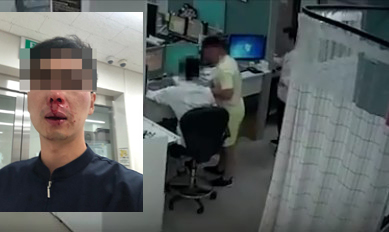The medical community is expressing shock and rage over a patient’s assault on an emergency room (ER) doctor in Iksan, North Jeolla Province.
At Iksan Hospital’s ER at about 10 p.m. on Sunday, the drunk patient attacked the physician, surnamed Lee, who was the head of the emergency medicine department.
The patient assaulted the doctor with his elbows and fists, saying the doctor ridiculed him and did not give him painkillers. Even when the attacker was getting arrested by the police, he threatened “to kill the doctor after returning from jail.”

However, the policy postponed the filing of the complaint, saying there was no person in charge. The police even released the patient who threatened to murder the doctor.
The victim suffered concussion and fractures in the nasal bone and teeth. He had to be hospitalized for three-week medical care.
After the news broke, Korean Medical Association (KMA) President Choi Dae-zip and Vice President Bang Sang-hyeok visited the hospital on Tuesday to comfort Lee. The two also went to the Iksan Police Station, claiming that the police did not take appropriate actions after the incident.
On the following day, the KMA and the Korean Society of Emergency Medicine (KSEM) called for the arrest of the perpetrator and a criminal investigation holding a news conference.
“We need a serious criminal punishment against the drunkard who assaulted the doctor in the ER, by the law and principles,” said Choi, the leader of the nation’s largest group of physicians. “We urge an immediate arrest and investigation.”
Choi went on to say that there are laws such as Medical Service Act, Emergency Medical Service Act, and Criminal Act to apply a severe punishment to the offender. “What’s important is whether the investigating authorities have a will to do so and how the court’s ruling practices will affect this case,” he added.
The Medical Service Act states, “No person may attack or threaten any medical personnel, assistant nurse, medical technician, or any person who receives medical treatment, at a place where medical practices are performed.”
The Emergency Medical Service Act also states that “no person shall interfere with the rescue, transfer, first-aid or medical treatment of an emergency patient provided by emergency medical personnel and a licensed practical nurse, by means of violence, threat, deceptive scheme, influence or by other means, or destroy, damage or occupy medical facilities, equipment and medicines or other objects used by a medical institution for emergency medical services.”
A person who breaks this law is subject to five years in prison or a fine of up to 50 million won ($44,657).
Lee Kyung-won, the policy director of the KSEM, demanded the government’s support to prevent violence in ER.
“Emergency medicine is the most significant area for public health. Verbal abuse and violence against a physician within the emergency medicine sector is a challenge against public health,” Lee said. “People should remember that violent acts in an ER can put other patients’ lives in danger.”
Criticism on the police’s inactive reaction to the Iksan case spread so widely that a citizen demanded a strong punishment against the offender on the Cheong Wa Dae’s online petition website.
The Ministry of Health and Welfare also requested the police to take a strong measure on the transgressor.
The ministry’s request is a rare move, as it used to say it would wait for the police’s investigation results when a similar incident occurred.
“It is regrettable that the assault on a doctor occurred in an ER. Attacking a doctor in the ER can directly threaten people’s health and life,” said Lee Gi-il, head of the public health policy at the health and welfare ministry. “It is a very grave issue. We will seek the National Police Agency’s cooperation so that the authorities can enforce due punishment.”
The ministry will also conduct a public campaign to prevent violence against emergency medical staffs and seek cooperation with a related society to discover what’s needed to improve the circumstances, Lee added.

